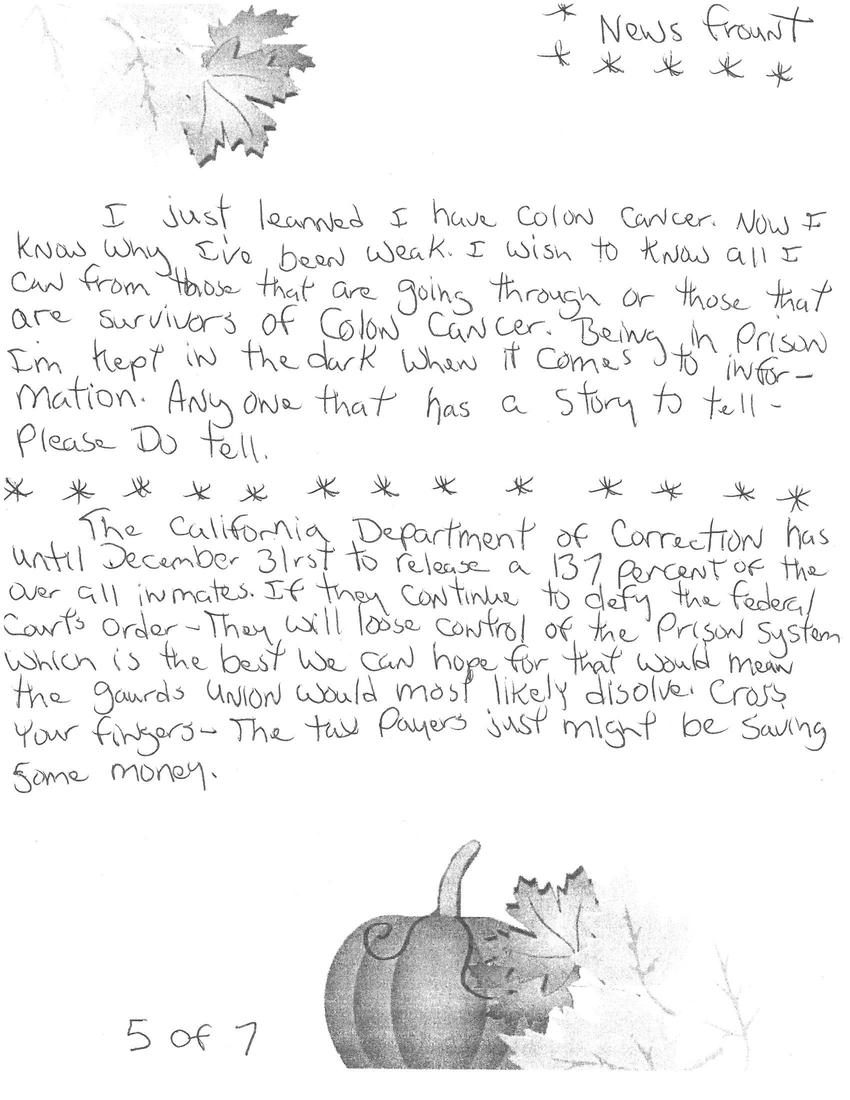
Transcription
News Front
I just learned I have colon cancer. Now I know why I've been weak. I wish to know all I can from those that are going through or those that are survivors of colon cancer. Being in prison I'm kept in the dark when it comes to information. Anyone that has a story to tell - please do tell.
*******************************************************************************************************************************************************************
The California Department of Correction has until December 31st to release a 137 percent of the overall inmates. If they continue to defy the federal court's order, they will lose control of the prison system, which is the best we can hope for; that would mean the guards' union would most likely dissolve. Cross your fingers -- The tax payers just might be saving some money.
Other posts by this author
|
2025 apr 13

|
2024 dec 10

|
2024 nov 10

|
2024 aug 21

|
2024 jun 25

|
2024 jun 10

|
More... |


Replies (3)
Find out all you can if they send you out. What 'stage' is it? What treatment are they offering.
Do you have any support outside prison (that can help)?
Please keep us up to date,
j
--Calhoun25
(And vitamin D3 is much much better than D2 so take that IF you can)
This is from the internet:
As early as 1980, colon cancer was credited as the first cancer to benefit from sunlight. Early U.S. studies noted high death rates in the Northeast. This area has limited sunshine. Low mortality rates were noted in the Southwest, which has more sunshine. Many studies since then have confirmed these findings for both colon and rectal cancer. Ultraviolet-B (UVB) light produces vitamin D. Researchers concluded that vitamin D provides the primary cancer benefit.
Vitamin D and colorectal cancer
Vitamin D levels
There are numerous studies of the link between vitamin D and colorectal cancer rates. Such studies generally find that rates drop rapidly as vitamin D levels rise above 5-10 ng/mL (12-25 nmol/L), then more slowly until levels of 40 ng/mL (100 nmol/L) are reached.
How vitamin D works
Vitamin D blocks the growth of cancer tumors. The active form of vitamin D, calcitriol, does most of the work. Calcitriol is made in the liver and in various organs affected by cancer. This form of vitamin D offers several benefits:
Activates vitamin D receptors, which turn genes on and off
Prevents cancer from starting (Calcitriol encourages cells to either adapt to their new organ or commit apoptosis [cell suicide].)
Keeps surface layers of organs intact
Limits blood supply to the tumor
Reduces the spread of cancer
Increases absorption of calcium from the intestines (Calcium may reduce the risk of colorectal cancer.)
Prevention
Based on studies of colon and rectal cancer, vitamin D levels above 40 ng/mL (100 nmol/L) may reduce the risk of cancer. Taking 1000–4000 international units (IU) (25–100 mcg)/day of vitamin D may lower colorectal cancer risk.
Treatment
People with higher vitamin D levels at time of colorectal cancer diagnosis have better outcomes.
Harvard University studied patients with this cancer and vitamin D levels of about 25 ng/mL (63 nmol/L) or 31 ng/mL (78 nmol/L). Patients with higher vitamin D levels had half the death rates compared of those with lower vitamin D levels. A Japanese study found a similar effect for rectal cancer but not colon cancer.
Neither of these studies used vitamin D to treat colorectal cancer. However, vitamin D supplements may increase survival rates. Some cancer treatment centers are giving patients 5000 IU/day of vitamin D3 (cholecalciferol).